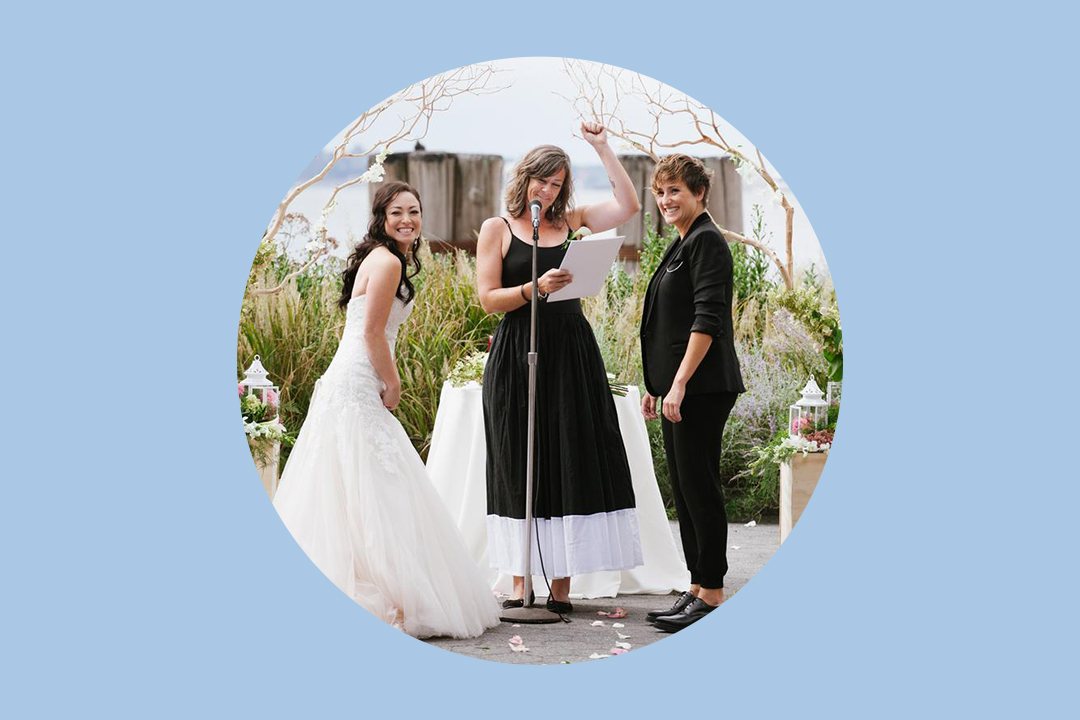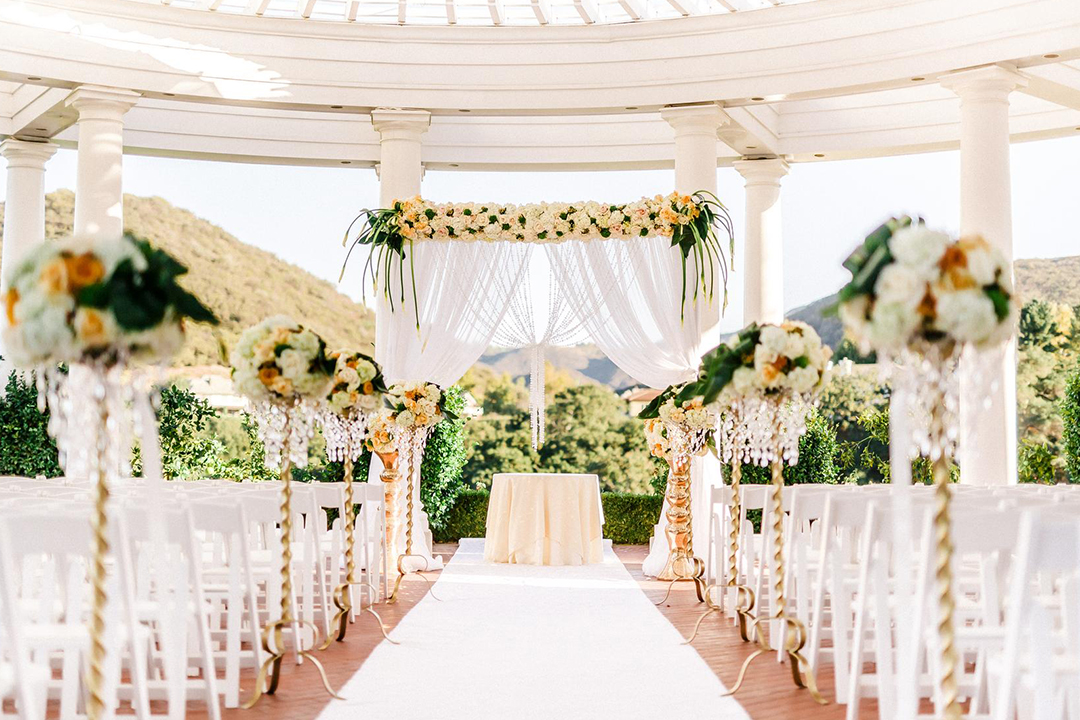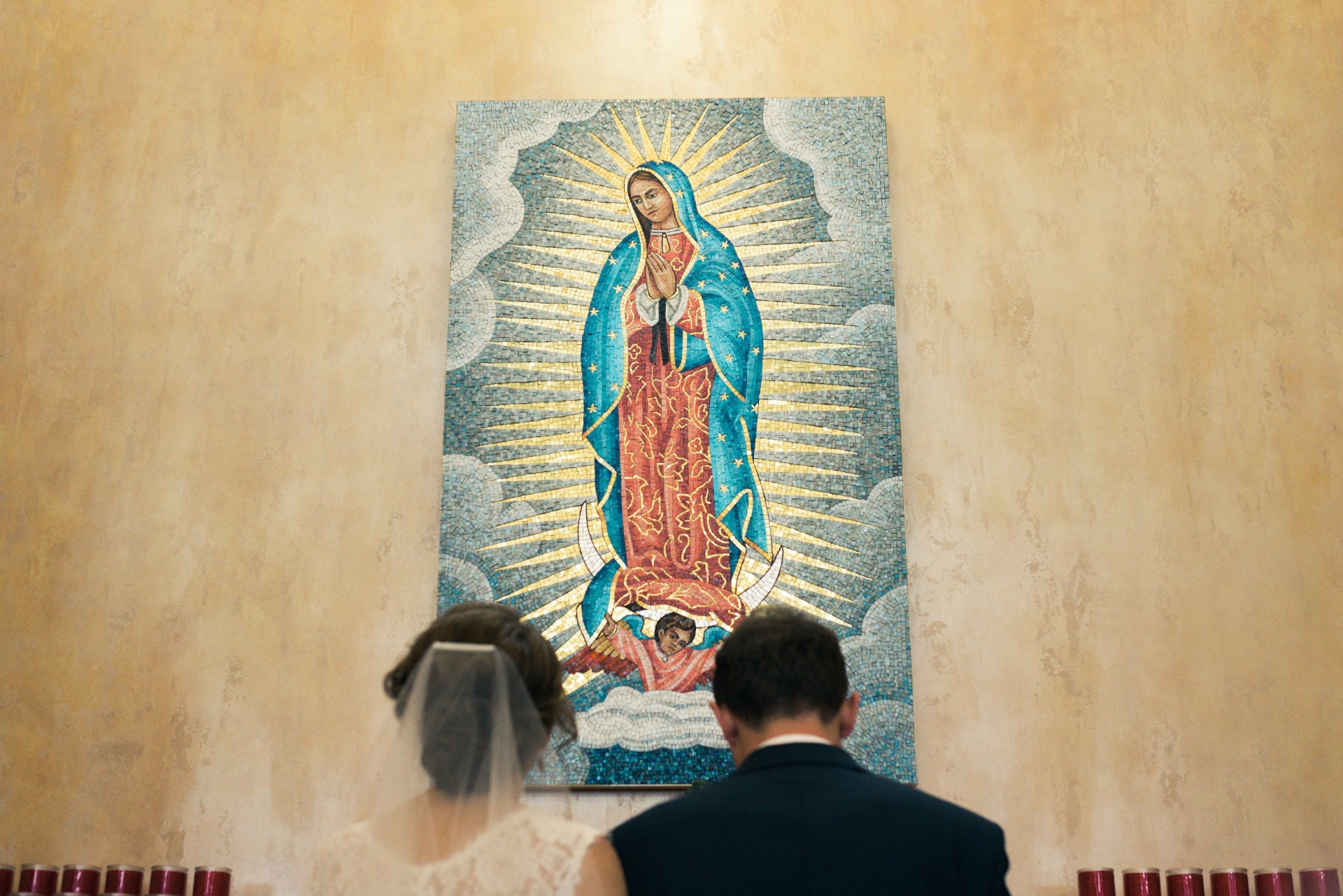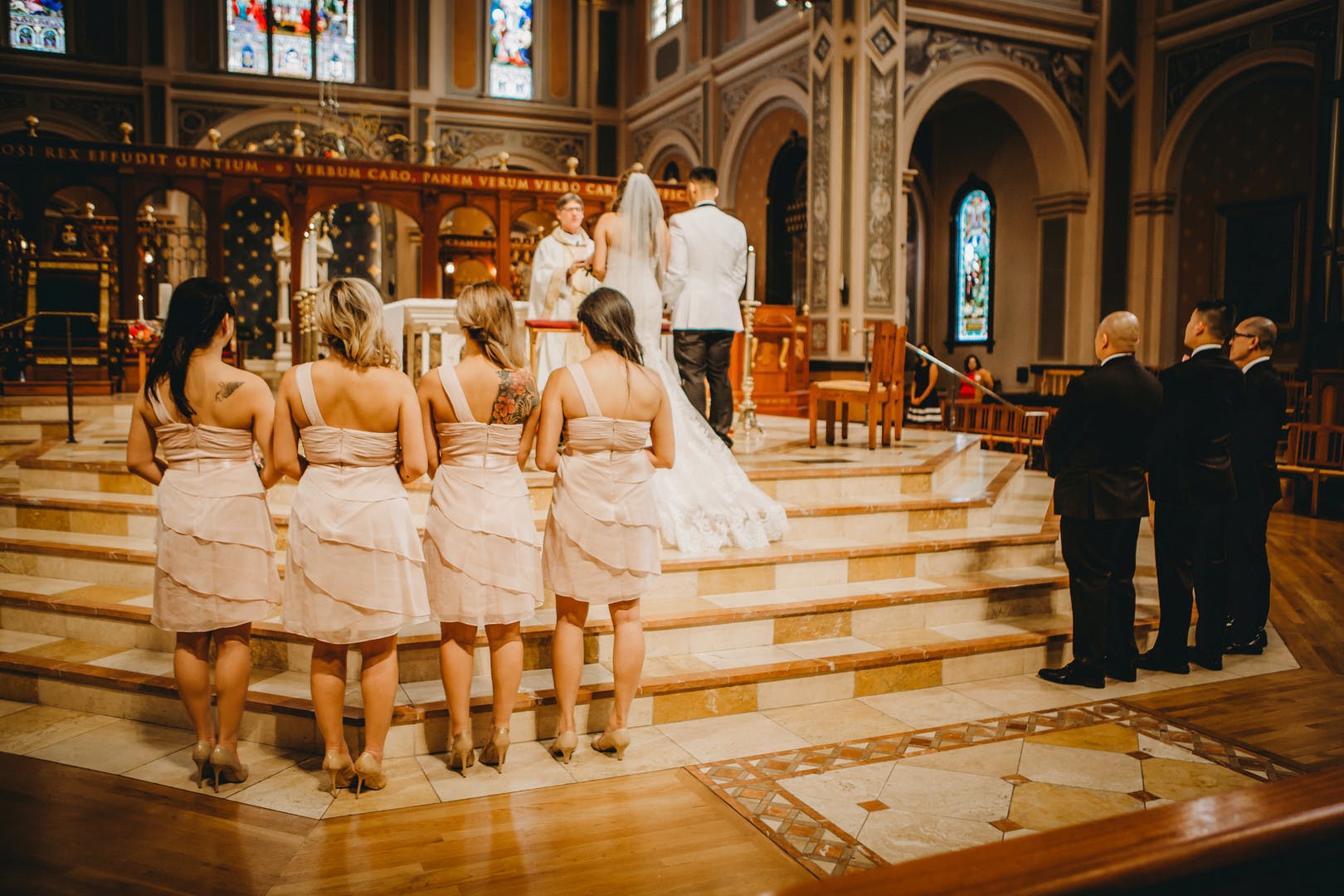- Expert advice/
- Wedding planning 101/
- Wedding planning tools/
- Pentecostal Wedding Guide
- Wedding planning tools
Pentecostal Wedding Guide
Holding a Pentecostal wedding has some unique aspects to it. If you’re planning to get married in this faith, there are a few things to keep in mind.
Last updated September 10, 2025

The First Look ✨
- There are a few different movements within the Pentecostal faith, so there may be slight variations from church to church in terms of traditions and requirements when it comes to the wedding ceremony.
- Be sure to meet with your priest, pastor, or wedding officiant so that you’re clear on what you and your partner need to know ahead of time.
- Nail down details such as the wedding date and guest list, and also meet with your pastor or priest ahead of time.
When it comes to planning a wedding, there are a lot of details to think about, especially when you’re a faith-based couple. For some couples, having their religion at the core of the wedding celebration is very important, while, for others, it may still be a factor, but simply will not play as prominent of a role. For folks who practice in the Pentecostal faith and are planning a wedding, there are several details to consider.
Different Movements Within the Pentecostal Faith
Pentecostalism is a Protestant Christian movement that emphasizes a direct experience with God through baptism with the Holy Spirit. There are several different movements within the faith itself, and, depending on which domination you practice, as well as your place of worship, there may be some slight variations to think about when it comes to your wedding ceremony. However, there are some details that will be consistent regardless of the church that you’re married in. Remember that there are ways to also personalize things while still upholding traditional rituals within your faith.
There are still details that all couples need to address—even when you’re planning a faith-based wedding—such as the venue for the wedding reception and ceremony, guest list, who will be marrying you, the wedding date, and others. Here are six important things to keep in mind when you're planning a Pentecostal wedding.
Finalize the Date
When it comes to the wedding planning process, having a date in mind is extremely important, but there's more to finalizing this essential detail than most people realize. Having the date in mind is extremely important because it will be dedicated when you book with your wedding venue, it will allow you to get your wedding officiant/priest/pastor/preacher on board, and it will allow you to secure vendors such as caterers, florists, calligraphers, and more.
To be on the safe side, picking a few dates may also work in your favor, especially if there are a lot of other ceremonies and events planned at your ceremony and/or reception venue(s). If you’re having a hard time deciding when you may want to get married, sometimes picking a date that correlates to your favorite season or one that holds personal significance for you and your partner can be helpful.
Perhaps you want to get married on the same day as you met, or maybe you want a date that is important for you both. Deciding sooner rather than later as to when the big day will happen is important because then you can get ahead of all of the larger details that come with planning a wedding.
Confirm the Guest List
Another big detail to check off your to-do list is finalizing your wedding list. Whether you’re going to have a large or small ceremony, this can be a stressful task to complete. When you’re putting the list together, try to keep in mind who you really want to be present on your special day, but also try to be open to suggestions.
While you may feel obligated to invite certain people, getting clear on the number of people you wish to invite and whom you’re inviting is really vital, as it will also play a part in deciding where you get married, your budget, and the reception details.
Meet With Your Pastor/Priest/Preacher/Wedding Officiant
Once you have decided on the date, the next thing you will want to do ASAP is get in touch with your pastor/wedding officiant and make sure that they are available. Once you have confirmed their availability and can schedule the service, you will also want to make time to meet with them regarding the specifics of what will happen at the wedding.
Generally speaking, a couple getting married within the Pentecostal faith will hold their ceremony in a church or house of worship. Typically, a couple will get married where they are active members within their congregation and where they attend services regularly. However, if you’re choosing to get married at a different church or location, it’s important to find out ahead of time if you do need to be a member there, or if there are other details that could affect holding your ceremony.
You also want to be clear, in advance, on any marriage requirements that the church has, so that you know what information or documentation is needed to be married there. If you or your SO isn’t part of the faith, you also will want to discuss any intermarriage options that exist or what the process for conversion is. If you or your partner was previously married and is divorced, this meeting is also a good time to ask your pastor/priest/preacher about what protocol must be followed so that you can get married in their church.
Typically, couples will meet with their priest/pastor/wedding officiant, a few times prior to the wedding to go over details. They will walk you through important points to keep in mind, such as what traditions and rituals may be performed, as well as other rules and regulations. They will also serve as the person who will oversee the wedding, so ask any questions that you may have about your service.
Examples of pertinent questions include:
- Does the church have dress requirements and/or a dress code?
- What is the structure of the ceremony, and are there requirements for the ceremony?
Knowing this information in advance can help you iron out any kinks that may come up, plus it will save you a lot of time and stress in the long run. Once you have figured out these details, then the fun can begin.
Plan the Ceremony
Planning the ceremony is where you and your partner can really start to showcase parts of your personality, and it’s when the wedding of your dreams will come alive. Also, think about the tone that you want. Should it be short and sweet? Or, longer and symbolic? Perhaps something in between?
Having these details in mind can help guide what you are after for your big day. Picking songs and readings that reflect both you and your partner's relationship can also be a beautiful touch; however, you also want to be mindful of the church and the type of ceremony that you’re aiming for. You want to choose songs and readings that are meaningful to you as a couple, but also are respectful and reflective of your faith.
Generally speaking, if you’re holding your ceremony in a church or house of worship, there will be great music. Your officiant can help arrange or organize music for you through their choir or band. If you’re a long-time member of that particular church, having their musicians and vocalists perform at your wedding can add another special detail to your ceremony.
You may want to include a wedding party and/or family members or friends in your wedding ceremony. Having people that you feel close to be a part of the wedding is a great way to make them feel included in the process, as they will be able to contribute to your celebration.
Secure a Venue for the Reception
While a big church wedding is gorgeous, one of the downfalls is that the reception cannot usually be held there, and this is one important thing to keep in mind with the planning. Typically, you have to book a separate venue to hold the reception at; however, depending on your church or house of worship, if they have a separate space, they may be able to accommodate both the ceremony and reception. If it is logistically possible, make sure that they can host you for both the ceremony and reception on the same date, because there may be other events booked.
If your place of worship isn’t able to host your reception, the other drawback is that your guests will have to travel to a separate location. If that’s the case, keep in mind how they will get there and if you should provide transportation.
Get Your Wedding License
With all the planning that goes into a wedding, one thing that some couples wait until the last minute to do is get the license. While the requirements for securing wedding licenses vary from state to state, here are a few things to keep in mind. There is some paperwork that you and your SO have to get together before applying for a marriage license. Be sure that you know where to get the wedding license paperwork.
In some states, this important document is issued through a municipal clerk’s office, while in other states it's simply a form that you download and fill out online. Keep in mind that the license is only valid for a specific time period between when it is issued and when your ceremony must take place. Following your wedding, the wedding officiant/priest/pastor, along with you and your partner, has to sign the license to make it legal. After signing, the license must be sent by the wedding officiant to be certified, and then you will receive your marriage certificate shortly thereafter.
Research ahead of time what the requirements are for applying for a marriage license in your state. A general checklist includes the following information:
- Birth certificate
- Parental consent, if underage (usually under 18); in some cases, you may also need legal consent from the court
- Photo identification (driver's license, state ID card, passport, or birth certificate)
- Social security number
- Proof of citizenship and/or residence
- Divorce decree, if divorced
- Death certificate, if widowed
Some states have a mandatory waiting period between obtaining a marriage license and holding a ceremony, so be sure to know what that information is ahead of time.
As you plan your Pentecostal wedding, it’s important that you and your partner are aware of the details specific to where you plan to hold your wedding. Knowing what the requirements are of your specific church, what the guest count is, as well as the logistics of the reception can help make the wedding planning process go as smoothly as possible. Being prepared will ensure that you and your partner have a beautiful celebration that you will remember forever.
Up next for you

Rehearsal Dinner Etiquette
How To
Have you been invited to a rehearsal dinner and are wondering what etiquette to follow? We're here to help. Read on to learn about rehearsal dinner etiquette.

10 Tips to Pick the Perfect Wedding Venue
How-To
How does one go about choosing a wedding venue? Here's the rundown on one of the first tasks you’ll need to accomplish after saying “yes!”

Are You Supposed to Tip Your Wedding Officiant?
Advice
Wondering if you should tip your wedding officiant? Whether they're a religious, professional, or civil officiant, here's everything you need to know before deciding on this gesture.

Wedding Aisle Flower Ideas
How-To
Here’s a look at some of our favorite wedding flowers and aisle decor ideas.
Featured

How to Plan a Catholic Vow Renewal
How-To
Planning on doing a Catholic vow renewal to celebrate your marriage? Read on for our top tips and advice.

What to Wear to a Church Wedding
How-To
A church wedding typically requires a more conservative outfit choice. Check out our guide to a church wedding dress code.

Buffet vs. Plated: Which Style of Catering to Choose
Advice
Wondering if you should do a buffet or plated dish for your wedding? Learn about the pros and cons of each with this complete guide.

A Guide to Wedding Ceremony Programs
Inspiration
Wedding ceremony programs communicate valuable information to your guests about your ceremony service—find out all you need to know to choose, word, and personalize your wedding programs.
- Expert advice/
- Wedding planning 101/
- Wedding planning tools/
- Pentecostal Wedding Guide
Find even more wedding ideas, inspo, tips, and tricks
We’ve got wedding planning advice on everything from save the dates to wedding cakes.
